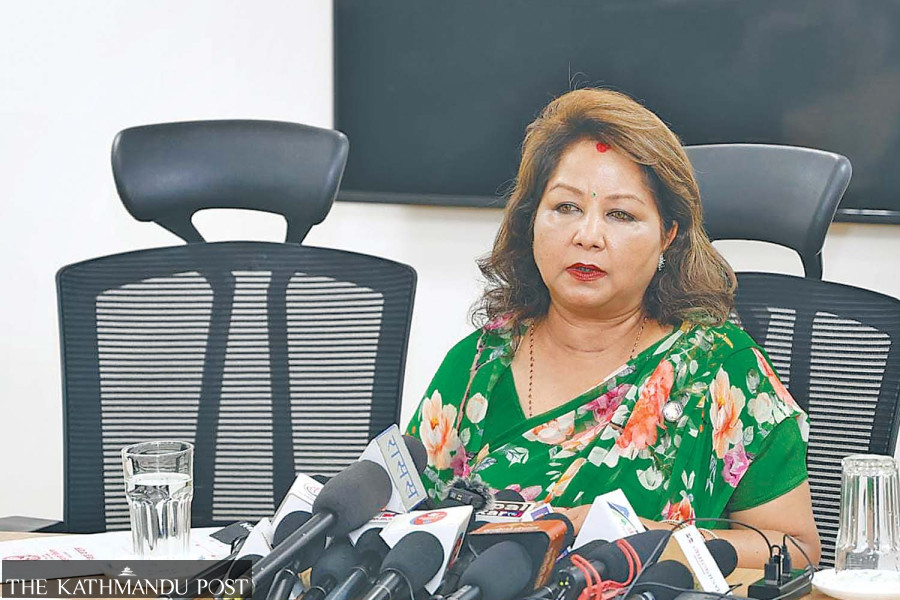National
India’s response to new Nepal coalition positive, says Foreign Minister Rana
Briefing her party Nepali Congress on Friday, Rana says high-level channel of communication has opened with India.
Post Report
Foreign Minister Arzu Rana, who returned on Thursday after completing a five-day official visit to India, has said that New Delhi’s response to the new government in Nepal was positive.
“Based on my discussion with Indian leaders and officials, India’s response and reaction to the new government constituted by two major political parties [in Nepal] was positive and good,” Rana said, briefing the party’s ongoing central working committee meeting on Friday on her interactions in New Delhi.
Rana paid an official visit to India from August 18 to 22, during which she called on Indian Prime Minister Narendra Modi and held bilateral talks with her Indian counterpart, S Jaishankar. She also met with other leaders and officials during her stay and regular health checkups in New Delhi.
“We were curious about India’s response to the formation of the new government in Nepal,” she told the Nepali Congress committee. “Let me inform you that India’s response and reaction were good and positive.”
About her meeting with Indian Prime Minister Modi, she said, “I met with Modi ji, who said India viewed the new government [in Nepal] as a positive development. I handed the invitation from our prime minister to Modi ji.”
Rana also briefed her party on the recent arrivals of delegations from China and the United States of America. Deputy Secretary of State for Management and Resources Richard Verma paid a two-day visit to Kathmandu last week, announcing an additional $100 million in US military aid to Nepal, subject to Congressional approval and the availability of funds.
The foreign minister said the US side communicated that it would provide two more helicopters and two struts to the Nepal Army, which will be used for disaster response. Similarly from China, Yang Weiqun, vice-chairman of the China International Development Cooperation Agency (CIDCA), is on a Nepal visit. He met Rana on Friday.
“Both Modi ji and Jaishankar ji assured me about India’s continued support for Nepal’s development endeavours,” Rana said on Friday, adding that her India visit was successful for several reasons. “During my meetings with Indian leaders, I communicated to them that Nepal’s peace process is headed in the positive direction with the parties agreeing on transitional justice law amendments, which is a positive outcome achieved after the formation of the new government.”
Rana said that Nepal and India had discussed several matters related to mutual interest and agreed to activate bilateral mechanisms. Soon, there will be a meeting of the Joint Commission on inundation and flood control.
“We received a letter from the Indian side on Friday,” Rana told the meeting. “My visit played a pivotal role in building trust between the two sides.”
“During my meeting with Modi ji and Jaishankar ji, I expressed Nepal’s concerns and interests. The visit has opened the line of communication at the highest level and at different levels to provide future direction for our cooperation and partnership,” according to a statement issued by Rana’s private secretariat.
“During my meeting with Minister Jaishankar, we discussed issues such as energy cooperation, trade and transit, connectivity, investment, air routes, infrastructure development, floods and inundations, the Pancheshwar Multipurpose Project, sports, and infrastructure in the bordering areas,” she said. “To address several issues between Nepal and India, we also agreed to activate bilateral mechanisms.”
Rana also briefed the party on her meeting with Yang, the vice-chairman of CIDCA, China’s external aid agency. The Chinese official looking after China’s external aid regime wants to know Nepal’s position on the Belt and Road Initiative (BRI).
Nepal and China signed the BRI framework agreement in 2017, but not a single project has been executed under it so far. The Chinese side unilaterally announced some projects under the BRI framework, but the government of Nepal has yet to recognise them.
A Congress leader said Rana had explained her party's position on BRI during her meeting with the CIDCA vice-chairman, but she did not mention the government's position on BRI.
The government has not discussed much about the BRI and its funding modality in Nepal. “Rana told Yang that our party has a clear position on BRI that we cannot afford a loan, so our preference would be grants, and if needed to take the loan, we will go for a soft loan equal to the interest rate of the World Bank, Asian Development Bank or any other global lender.”
On Thursday, four different letters of exchange were signed between Nepal and China to carry out the four projects which will be built with Chinese grants.
Four different letters were exchanged to upgrade the 8.2-kilometre Kalanki-Maharajgunj Ring Road, build an Integrated Check Post (ICP) and an Inland Container Depot (ICD) at Korala in Mustang, and conduct a feasibility study for repairing and maintaining the Araniko Highway.




 16.12°C Kathmandu
16.12°C Kathmandu














